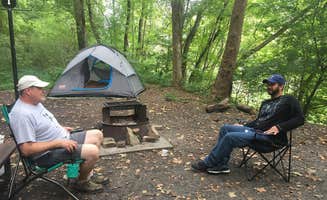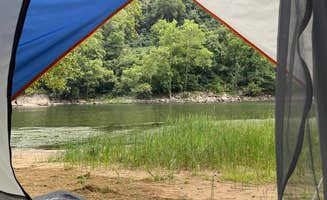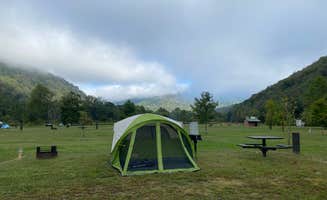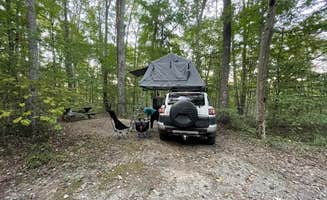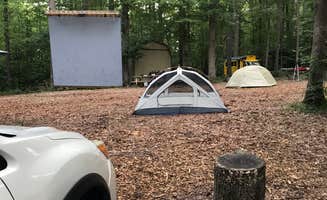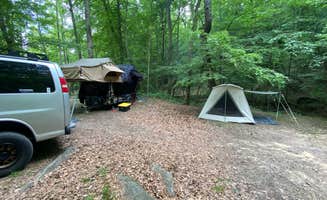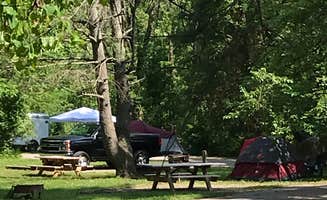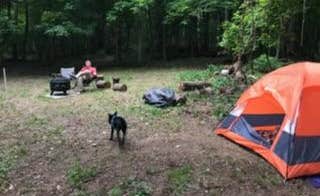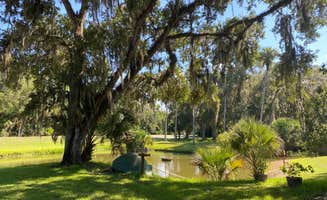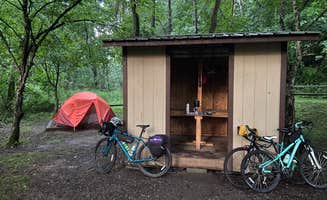Tent camping opportunities near Danese, West Virginia range across an elevation span of 1,500 to 2,500 feet in the Appalachian region. The area typically experiences moderate rainfall with summer temperatures averaging 75-85°F and significant cooling at night. Fall camping requires extra layers as overnight temperatures often drop into the 40s even in September, with frost possible in October.
What to do
Hiking to waterfalls: At Plum Orchard Lake WMA, campers can explore surrounding trails with varying difficulty levels. One visitor noted, "We enjoyed hiking the trails, swimming in the lake and sitting by our campfire."
Climbing experiences: The New River Gorge region offers extensive climbing routes for all skill levels. A visitor to New River Gorge Campground mentioned, "This campground is well maintained and located in the heart of the New. It's a quick walk to the Junkyard Wall or a short drive to many other classic crags."
Disc golf: Some campgrounds provide additional recreational activities on-site. Chestnut Creek Campground offers a disc golf course as one camper mentioned: "Has a Frisbee/Disc Golf Course. Close to rivers, climbing and hiking activities."
Train watching: The historic railroads running through the gorge provide unique train-watching opportunities. At Brooklyn Campground, "There is an active railroad across the river and there were probably 5-10 trains the Wednesday night that we stayed."
What campers like
Natural swimming spots: River access for cooling off ranks high among campers visiting in summer months. At Stone Cliff Campground, a visitor shared, "I loved the experience I had at stone cliff. The camp sites are well marked and maintained. There are some right on the river and a couple more set back closer to the trail. Great spot to set up a hammock, go swimming, or walk on the nearby trails."
Private camping sites: Most tent campers value the privacy between sites. According to one reviewer at Chestnut Creek Campground, "Most sites are simple with just a picnic table and fire pit. There are lots of trees in between many of the sites for great privacy."
Wildlife viewing: The region offers opportunities to observe native wildlife. A camper at East Shore Campground simply stated, "If you like hiking and fishing this is the place," while others have reported seeing deer, raccoons, and birds throughout the region.
Firefly displays: Summer camping provides natural light shows after dark. One visitor to Meadow Creek Campground shared, "Watched a cluster of fireflies that looked like a lightning storm. Just off the river and just off the highway, no water."
What you should know
Train noise concerns: Multiple campgrounds in the New River Gorge area have railroad tracks nearby. At Meadow Creek Campground, "The biggest con to this is the multi-track railroad right next to the campground. They go by pretty frequently at all hours of day and night and are so loud you can feel the vibrations."
Tent platform considerations: Some sites feature wooden platforms rather than ground space. At New River Gorge Campground, "This is a very well thought out campground and is a great option for climbers visiting the area. Each site has a wooden tent platform (10'x10') to set up on, which is a huge plus since the ground is so uneven throughout."
Bathroom facilities: Facility quality varies widely between campgrounds. As one camper at Old Mill Campground noted, "The bathhouse is open air over half of it. Had no soap or toilet paper and the toilets were all plugged up."
Payment systems: Many campgrounds operate on self-service payment systems. Brooklyn Campground features a straightforward system where "There is no check in. You just arrive and pick a site."
Tips for camping with families
Site selection for privacy: Choose campgrounds with natural buffers between sites. At Chestnut Creek Campground, "This is a quiet campground, with lots of space and site options, run independently by a family. Most sites are simple with just a picnic table and fire pit."
Spider awareness: Large spiders are common in wooded areas. One visitor to Stone Cliff Campground warned, "We were hanging some hammock stapes up on our last evening and saw the largest spider I've ever seen in the hollow of one of the trees at the campsite. If spiders aren't your thing consider another site."
Water safety: Fast-moving river currents require supervision. A camper at Meadow Creek Campground observed, "There is a river nearby but it has a very strong current."
Early arrival recommended: Secure better sites by arriving during weekdays or early in the day. At Stone Cliff, one visitor noted, "I used one of the walk in sites about half a mile into the trail. There was plenty of room for 4 tents right along the river."
Tips from RVers
Access limitations: Many campgrounds have terrain limitations for larger vehicles. At Brooklyn Campground, "The handicap site is the only one that you can drive directly up to. The 4 sites by the river have a parking lot and you walk (not very far at all, 10 - 50 yards) to them."
Conversion changes: Some former RV campgrounds have been converted to tent-only spaces. As one camper at Meadow Creek Campground explained, "The ranger informed us someone who stayed here in a rv had a close call crossing the train tracks and now they have decided to make this campground a tent only place."
Road conditions: Access roads to more remote camping areas can be challenging. A visitor to Plum Orchard Lake WMA reported, "Long, bumpy dirt road to reach the campsite—it could be fun in the right vehicle. Decent sites, heavily wooded."


